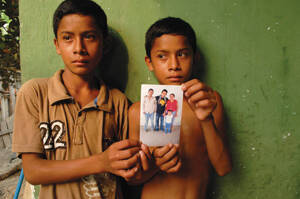Concerns about the potential for the return of human rights abuses in Guatemala have been raised now that a retired general with a controversial past has been elevated to the presidency. Otto Pérez Molina directed a military intelligence unit during Guatemala’s 36-year war. His victory was widely predicted, but Catholic leaders remain unsure what to expect when the soldier-turned-politician takes office in January.
“As a candidate, he made some promises, such as the creation of a ministry of social development, that I would like to see him follow through on,” said Bishop álvaro Ramazzini Imeri of San Marcos, a department in Guatemala’s highlands. “But until he starts to name his cabinet and set priorities, it’s hard to say...how the Catholic Church’s relationship with his administration will be.”
Pérez Molina has promised an aggressive campaign against the Central American nation’s crime problem. What that means remains to be seen, but the rhetoric troubles some Catholic leaders.
“The church, the human rights community, we do not support the iron-fist approach that he’s in favor of,” said Nery Rodenas, director of the Archbishop’s Human Rights Office in Guatemala City. Rodenas said that strategy is ripe with the potential for abuse, similar to the problems Guatemala experienced in the past.
“It’s not the answer to criminality,” Rodenas said.
Pérez Molina defeated Manuel Baldizón in a presidential election marked by populist messages and promises to confront insecurity. He captured 54 percent of the vote on Nov. 6 and immediately vowed to tackle crime.
The uncertainty over how Pérez Molina will govern is fed by his complicated role during the war. He commanded forces in a rural area where the military carried out brutal massacres as part of a scorched-earth campaign.
Later, Pérez Molina directed the military intelligence unit D-2, which has been accused of taking part in the abduction and torture of a guerrilla leader. Pérez Molina, who has never been charged, has denied allegations that he committed human rights violations during the war.
“He is seen as a more modernizing element of the Guatemalan military,” said Michael Allison, a political science professor at the University of Scranton in Pennsylvania. “While he was still part of the military during that time, he has a reputation for not being one of the strongest advocates of the scorched-earth approach.”
Pérez Molina has dismissed the findings of a U.N.-sponsored truth commission that concluded government forces were responsible for 93 percent of the war’s estimated 200,000 deaths and disappearances. He has also been quick to criticize the findings of the Catholic Church’s own truth commission. Former Auxiliary Bishop Juan Gerardi Conedera of Guatemala City presented that commission’s report in 1998. It charged that the Guatemalan military was primarily responsible for the war’s death toll. Two days later, Bishop Gerardi was bludgeoned to death in his garage.
In The Art of Political Murder: Who Killed the Bishop? published in 2007, which documented the killing of Bishop Gerardi and the subsequent investigation, Francisco Goldman alleged that Pérez Molina was a mastermind of the murder. Pérez Molina has denied the accusation. Today, many Guatemalans are primarily concerned with the violent mix of drug trafficking, criminal gangs, extortion and corruption that fuels roughly 6,000 murders a year. The country is among the most violent in the world.








